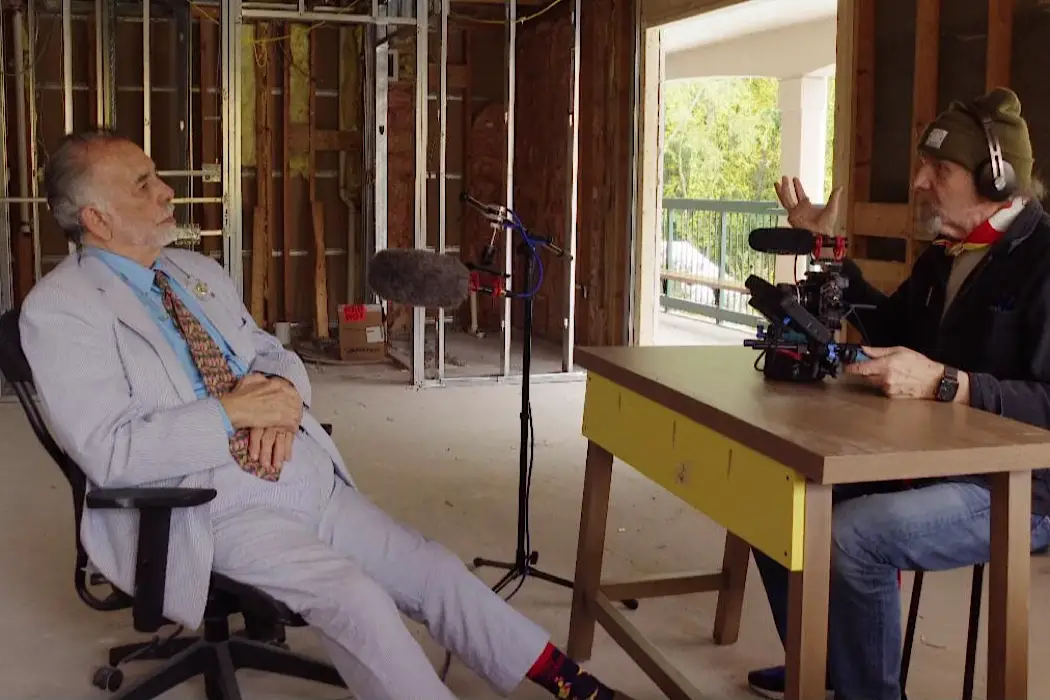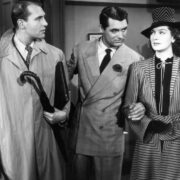Coppola Gets the Rap World Treatment in MEGADOC

Payton McCarty-Simas is a freelance writer and artist based in…
It’s perhaps fitting that Mike Figgis’ documentary on the making of Francis Ford Coppola’s Megalopolis is as strange as it is. For that particular audience who embraced the famously difficult elder statesman’s experimental, utopian-minded passion project nearly half a century in the making upon its release last year, the news that a documentary was going to pull back the curtain on the process and perhaps provide some clarity was deeply tantalizing. Yet, in a perversely satisfying turn of events, Megadoc actually replicates Megalopolis’ own prevailing sensations of confusion and autuerist egomania run wildly amok. Hearts of Darkness this is not, nor is it even Overnight; it feels more like Rap World.
According to Glenn Kenny, Figgis, best known for narrative films (Infernal Affairs, Leaving Las Vegas) only got the job of official Megalopolis documentarian “because he was hanging around the Atlanta set during preproduction, and he just… asked.” It certainly feels that way as he drifts around set with a camera asking strained, shallow, often vaguely New Age-y questions to confused crewmembers and stressed actors. He’s clearly on the periphery, unable to access his subjects. Yet, for some reason, much of his documentary’s runtime is dedicated to diaristic voiceover and cutaways to Figgis himself wearing a beanie and headphones self-importantly venting his personal insecurities about his place in the set’s pecking order (“It’s a bit annoying… I have to remind myself I’m not the director, I’m making a documentary”), scheming how to inveigle notably absent star Adam Driver into sitting down for an interview (he eventually does, and ironically Driver seems to be the only actor who’s calm, cool, and locked in on the exact same wavelength as the movie he’s in), or musing on Coppola’s process more than actually asking him about it.
Everything about this documentary feels haphazard, verging on parody, and not just because the production being captured comes off like a cross between a high school play and a twenty four hour film festival stretched out to purgatorial infinity. The film is a loose assemblage of verité footage of rehearsals and shooting (no pre-production or editing) that lacks any fundamental structure. For a while, random budget information appears at the bottom of the screen, an offputting conceit that’s eventually dropped anyway, leaving the sporadically ticked off shooting day numbers (how many days there were total isn’t clear) the only guiding principle. Francis’ wife Eleanor Coppola’s death is handled jarringly, with a random in memoriam still inserted after a random scene of her talking to the crew. The film similarly doesn’t provide any context on the film’s fascinating, embattled history or even the film itself, which is never remotely summarized or even discussed on a thematic level. Reader, if you don’t have a good working knowledge on the plot of Megalopolis down cold, watching Megadoc will make you question whether you’ve seen it at all. Even those obsessives who saw it more than once may find themselves asking things like, “who is Nush again, and what are these rollerskates for?”
None of this is to say there aren’t endless pleasures to watching this documentary that should obviously have been called Megadocolis. There are some interesting thematic questions valiantly treading water here as well, though most are too loosely connected to rightly be called motifs: Figgis focuses on Coppola’s desire to play rather than work on his films, while also showcasing several compelling discussions about indexicality and cinematic reality. Mostly, though, fans of Coppola’s disasterpiece will almost certainly have a field day as I did watching the chaos play out––spotting all manner of boom mics float in and out of frame throughout could be its own drinking game. Jon Voight, Shia Leboeuf, Aubrey Plaza, and Dustin Hoffman all agreed (perhaps unwisely) to be interviewed extensively for the film, Plaza on a wrinkled, red-curtained backdrop violently lit in a manner that can only be described as overtly carceral. Voight seems confused but game, tossing a football and laughing at acting exercises; Hoffman just looks happy to be there (“Francis told me, ‘I wrote this part for Jimmy Caan, but he’s since passed’”) never more so than when he and Plaza compete in a bizarrely sexual arm wrestling match during an improvisational take of an office scene. Leboeuf for his part, is the other central point of tension in the works. Eyebrowless for some reason, the cancelled method actor proceeds to have a series of on-camera breakdowns and arguments with Coppola who sports colorful suits and ties and seems largely miserable (“If I’m not needed, I’ll go…” he says at some point, walking off his own set), except when he’s offering direction like “In this take, you’re Rapunzel, but with a side of Wow.”
Scrappy and befuddled though Megadoc may be, Figgis has captured something inexplicable, compelling, and beautiful seemingly despite himself, a feeling that encapsulates the experience of watching Megalopolis in some sense better than a good documentary on the subject might have otherwise been able to do. To quote Coppola himself after a perfectly arduous day of shooting, “Bravo, goddamnit.”
Does content like this matter to you?
Become a Member and support film journalism. Unlock access to all of Film Inquiry`s great articles. Join a community of like-minded readers who are passionate about cinema - get access to our private members Network, give back to independent filmmakers, and more.
Payton McCarty-Simas is a freelance writer and artist based in New York City. They grew up in Massachusetts devouring Stephen King novels, Edgar Allan Poe stories, and Scooby Doo on VHS. Payton holds a masters degree in film and media studies from Columbia University and her work focuses on horror film, psychedelia, and the occult in particular. Their first book, One Step Short of Crazy: National Treasure and the Landscape of American Conspiracy Culture, is due for release in November.













